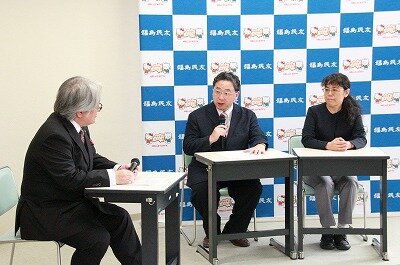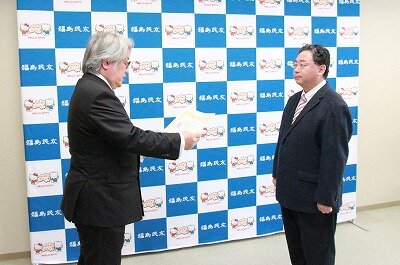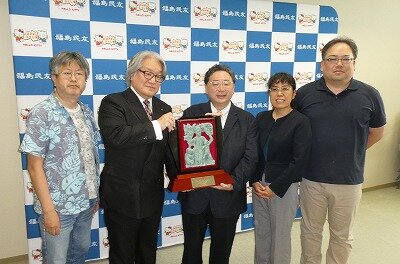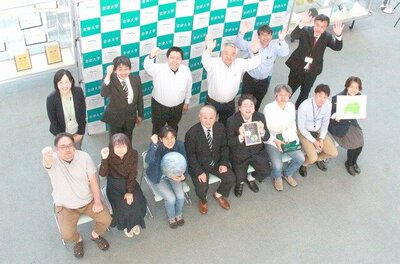On Tuesday, May 7, 2024, the University's space informatics research team won the Art and Culture Award of the 34th Minyu Citizen's Awards (sponsored by THE FUKUSHIMA MINYU SHIMBUN), which honors individuals and organizations whose achievements have brought honor to the people of Fukushima Prefecture.
The team received a plaque and a cash prize of 500,000 yen for their participation in the Japan Aerospace Exploration Agency's (JAXA) Hayabusa and Hayabusa2 asteroid explorer missions, the Smart Lander for Investigating Moon (SLIM) mission, and other projects recognized as having generated world-class achievements.
The award ceremony was held at the University on Wednesday, July 24, 2024.

2024.7.24(Wed)Minyu Citizen's Prize Roundtable Discussion (President Nozaki, Professor Demura, Professor Otake)

2024.7.24(Wed)Minyu Citizen's Prize Award Ceremony

Award Ceremony (from left, Senior Associate Professor Hirata, President Nozaki, Professor Demura, Professor Ohtake, Associate Professor Honda)
Comments by Professor DEMURA Hirohide, Director of Aizu Research Center for Space Informatics (ARC-Space) (*1) (*2)
The University of Aizu has played an important role in projects that have left their mark on the history of science. This includes the Hayabusa and Hayabusa2 asteroid explorers, as well as the Kaguya (SELENE) lunar orbiter, each of which achieved world-first achievements including the first sample return from an asteroid. The University of Aizu has woven a dense history in the field of space development for more than 20 years, playing a role in Japan's space development, and is particularly highly regarded for its practical competence in ICT (Information and Communication Technology). It is also involved in various projects currently under development, including Martian Moons eXploration (MMX), which aims to recover samples from a Martian satellite, and the European Space Agency's (ESA) Hera, the Binary Asteroid Exploration Program.
The university's reputation was enhanced by the Hayabusa project, in which it was involved in analyzing the shape of asteroid Itokawa. One of the many research results of this project was the paper "Pole and Global Shape of 25143 Itokawa," for which I was the lead author, which elucidated Itokawa's overall shape, the direction of its rotation axis, and its constricted ring structure, and was published in the American scientific journal Science. With Hayabusa2, a paper for which Associate Professor KITAZATO Kohei (*3) was the lead author was published in Science, and a paper co-authored by faculty members and a student (*4) was also published. Meanwhile, Professor OHTAKE Makiko (*5) and Associate Professor HONDA Chikatoshi (*6) participated in many aspects of the SLIM project, which achieved the world's first high-precision pinpoint lunar landing in January 2024, including the operation of observation instruments.
In parallel, Professor OHTAKE is also working on the Hakoniwa Program (Moon/Mars Garden Program)" (*7). The program, which is based at the Fukushima Robot Test Field in Minamisoma City, aims to establish a testing and evaluation center for space exploration rovers that combines real space with a virtual space to simulate the lunar environment and its lower gravity. This research is also expected to help Japanese companies provide a "guarantee" when they sell their rovers to the U.S. space industry. It will certainly help promote industry in our prefecture as well. Professor OHTAKE describes her vision for the future this way: "We would like to turn the region around the testing and evaluation center into a supply chain that will support the development, design, manufacturing, evaluation, operation, and data analysis of space and extreme robotics."
At the Aizu Research Center for Space Informatics, in addition to space missions, the other pillar that adds new value to observation data is the realization of "archival data science." Data must progress in lock-step with software to remain useful. One of our core activities as a Joint Usage and Research Center designated by the Ministry of Education, Culture, Sports, Science and Technology (MEXT) is developing software in collaboration with industry and academia to give new value to open data.
The University of Aizu will open the way to the future by developing human resources through top-down education that motivates students by showing them the cutting edge of science, and by supporting the improvement of science and mathematics education in the prefecture through off-campus lectures.
(*1) Professor DEMURA Hirohide
(*2) Aizu Research Center for Space Informatics (ARC-Space)
(*3) Associate Professor KITAZATO Kohei
(*4) University Web News



